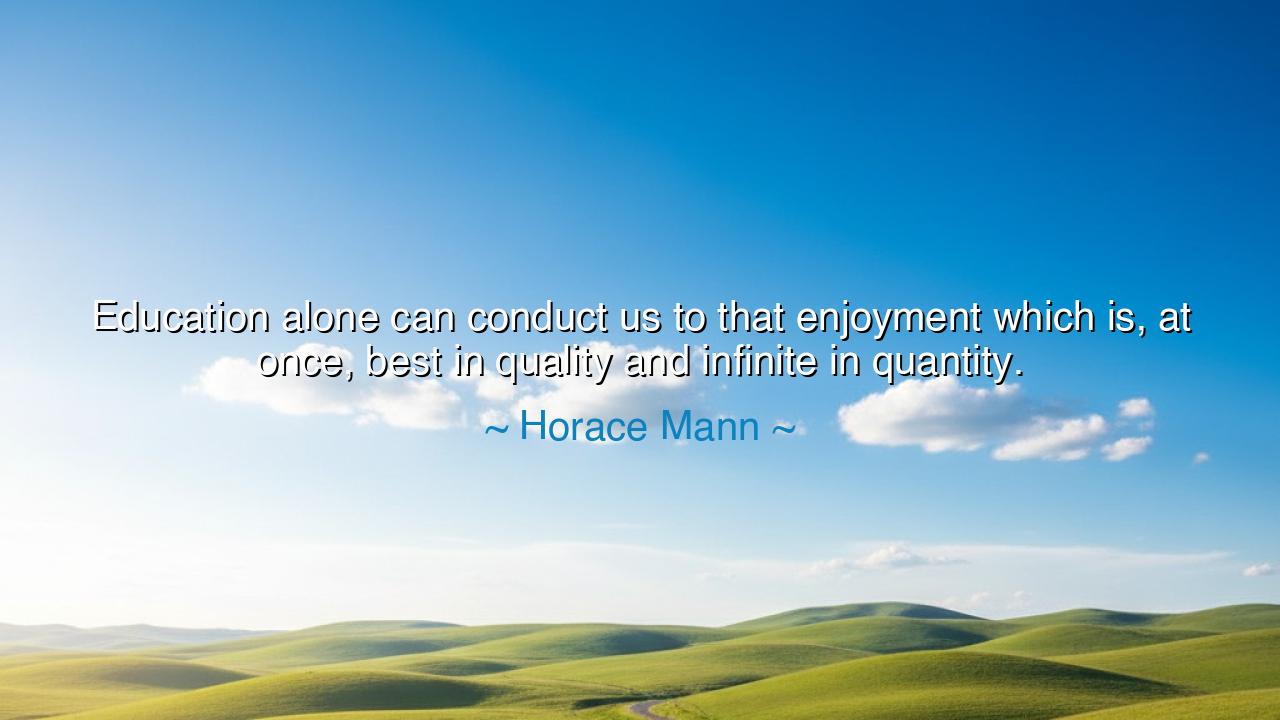
Education alone can conduct us to that enjoyment which is, at
Education alone can conduct us to that enjoyment which is, at once, best in quality and infinite in quantity.






“Education alone can conduct us to that enjoyment which is, at once, best in quality and infinite in quantity.” Thus declared Horace Mann, the father of American public education, who labored with tireless devotion to make learning the inheritance of every child. His words are not the empty praise of books, but the deep conviction of one who saw education as the golden key to both happiness and freedom. In them lies a truth so profound that it resounds across ages: that only education can guide us to the highest form of joy—joy that is pure, joy that is unending, joy that cannot be stolen by poverty or diminished by time.
What did Mann mean by this? He saw that earthly pleasures are fleeting. Wealth may fade, power may corrupt, beauty may wither, but the pleasures of the mind and soul endure. To read, to understand, to discover, to contemplate—these are joys that do not diminish with age, but grow richer the more they are pursued. And it is education that awakens the mind to these treasures. Without education, the soul wanders hungry, satisfied only by shallow entertainments. With education, the soul learns to feast upon truth, wisdom, and beauty, which are infinite in supply and eternal in value.
The ancients themselves proclaimed this wisdom. Aristotle taught that happiness is found not in possessions, but in the exercise of the mind toward virtue and truth. Cicero declared that to be ignorant of history is to remain forever a child, unable to partake of the true banquet of life. Mann, echoing this lineage, reminds us that education alone can raise us to the highest pleasures, those “best in quality,” because they ennoble the spirit, and “infinite in quantity,” because there is no end to what may be learned.
Consider the story of Frederick Douglass, born into slavery, denied by law the right to learn. Yet he taught himself letters in secret, and through that act, he discovered freedom within his own mind. Later, he would write, “Knowledge makes a man unfit to be a slave.” The chains that bound his body could not bind his soul once it had tasted the infinite joy of learning. Here we see Mann’s truth embodied: only education could lead Douglass to a joy that surpassed circumstance, a freedom that endured beyond all chains.
Mann also spoke as a reformer, warning his society that without education, people are condemned to lives of toil and ignorance, finding only fleeting pleasures in things that fade. But with education, they could rise to a joy that is both deep and eternal. A farmer who can read sees more in his fields than soil; a worker who can calculate and imagine sees more in his craft than labor. Education transforms the common into the extraordinary, and thus transforms life itself into a continual source of wonder.
What lesson must we draw? It is this: seek the joy that does not perish. Do not be content with shallow pleasures alone, but cultivate the mind through study, reflection, and curiosity. Parents, give your children not only bread for their bodies, but knowledge for their souls. Teachers, remember that you are not only imparting facts, but opening the gates to infinite joy. Students, pursue learning not as a duty alone, but as the path to freedom, happiness, and eternal growth.
So let Mann’s words echo within us: “Education alone can conduct us to that enjoyment which is, at once, best in quality and infinite in quantity.” This is no small promise—it is the promise of a life whose joy grows richer with every page read, every truth discovered, every mystery explored. Take up this path, and you will find that while riches may be lost, while power may pass, the joy of learning will never leave you. For it is the one treasure that is both inexhaustible and eternal, leading the soul ever upward into light.






AAdministratorAdministrator
Welcome, honored guests. Please leave a comment, we will respond soon